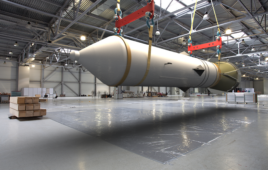(Reuters) – Lockheed Martin and Alliant Techsystems Inc said on Thursday they were teaming up to build and sell a booster rocket known as Athena, hoping to tap into a growing market for small satellites.
The joint venture restructures and re-introduces for commercial sale a booster that flew seven times between 1995 and 2001 with five successful missions, including putting NASA’s Lunar Prospector spacecraft into orbit around the moon.
Athena program manager Al Simpson said a declining market for small satellites had prompted Lockheed Martin to mothball production a decade ago.
Now, new demand for small satellite launch services coming from the Department of Defense and NASA make the Athena economically viable, with an estimated launch rate of one- to two missions per year, Simpson said.
The company plans to offer two versions of the rocket. Athena 1 will carry about 1,540 pounds (700 kg) to an orbit 100 nautical miles above Earth and Athena 2 will be able to lift more than 3,770 pounds (1,712 kg)to the same orbit.
The Athena will compete with Space Exploration Technology’s Falcon 1 and several rockets sold by Orbital Sciences Corp, among others.
Athena is expected to fly from a launch complex at Cape Canaveral Air Force Station in Florida that recently was acquired by Space Florida, a state-backed economic development group. Other launch sites for Athena include Vandenberg Air Force Base in California, Wallops Island in Virgina and Alaska’s Kodiak Island.
Filed Under: Aerospace + defense




